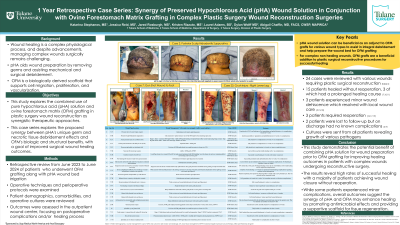Case Series/Study
(CS-154) 1 Year Retrospective Case Series: Synergy of Preserved Hypochlorous Acid (pHA) Wound Solution* in Conjunction with Ovine Forestomach Matrix Grafting** in Complex Plastic Surgery Wound Reconstruction Procedures

Methods:
At one academic hospital from June 2023 to June 2024, data was collected by retrospective review of all patients who underwent OFM grafting in conjunction with pHA wound bed irrigation by a single plastic surgeon. Perioperative techniques and protocols were examined. In addition, patients’ demographics, comorbidities, and operative cultures were reviewed. Outcomes were assessed in the outpatient wound center based on post-operative complications and healing outcomes.
Results:
24 patients with varying acute and chronic wounds requiring plastic surgical reconstruction were included in the analysis. All patients received intraoperative pHA irrigation and OFM grafting. Patients had wound preparation preoperatively with pHA and/or inpatient post-surgical graft and donor site management with pHA. 15 patients healed without reoperation. 3 had prolonged healing courses. 1 patient experienced minor wound dehiscence which resolved with local wound care. 3 patients required reoperation. 5 patients were lost to follow-up but upon discharge had no known wound complications. Cultures were sent from all patients revealing growth of various pathogens.
Discussion:
This study demonstrates the potential benefit of combining pHA solution with OFM grafting for improving healing outcomes in patients with complex wounds. The results reveal high rates of successful healing. A majority of patients achieved wound closure without reoperation. While some patients experienced minor complications, overall outcomes suggest the synergy of pHA and OFM may enhance healing by promoting antimicrobial effects and providing a supportive scaffold for tissue regeneration.

.jpg)